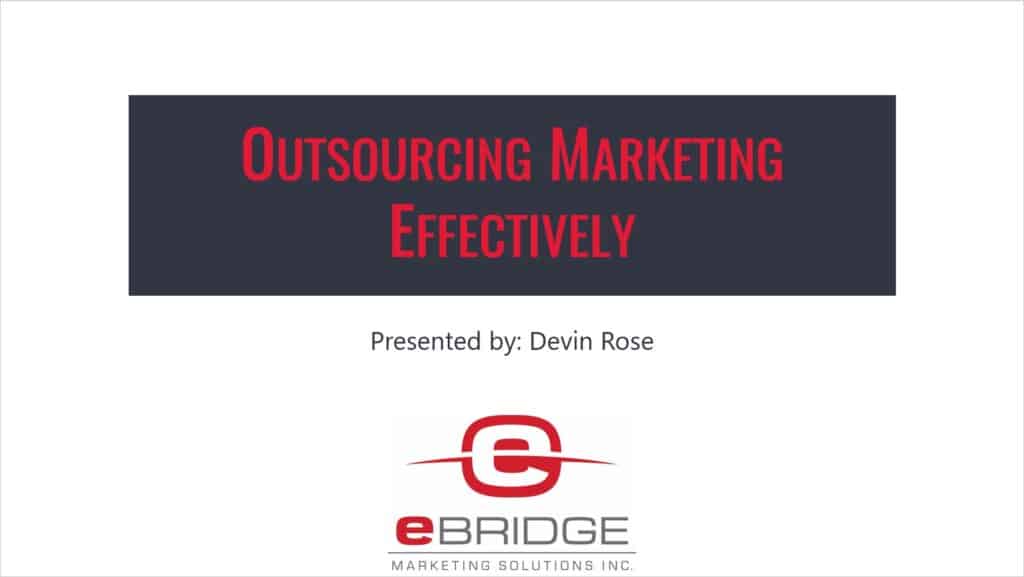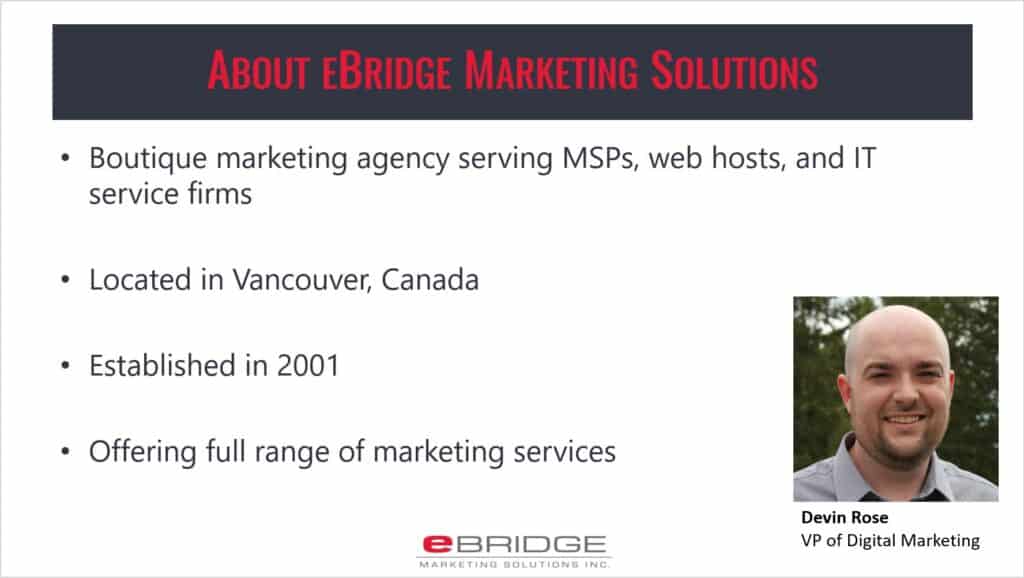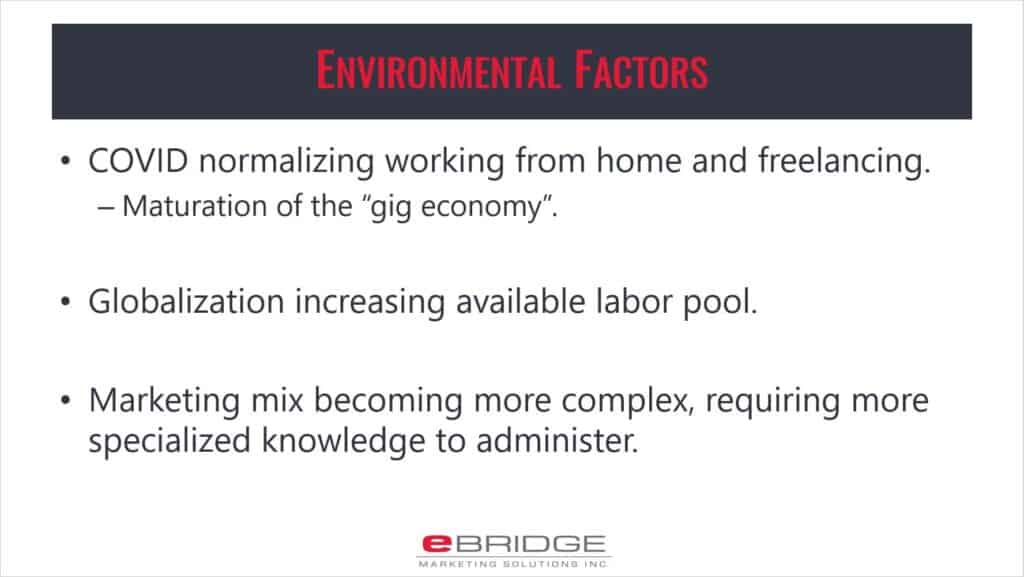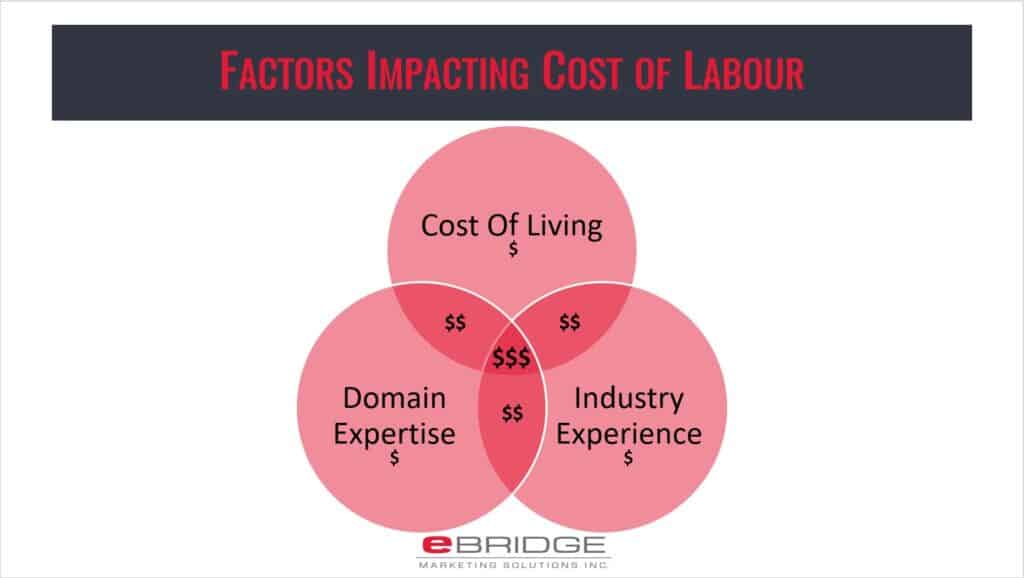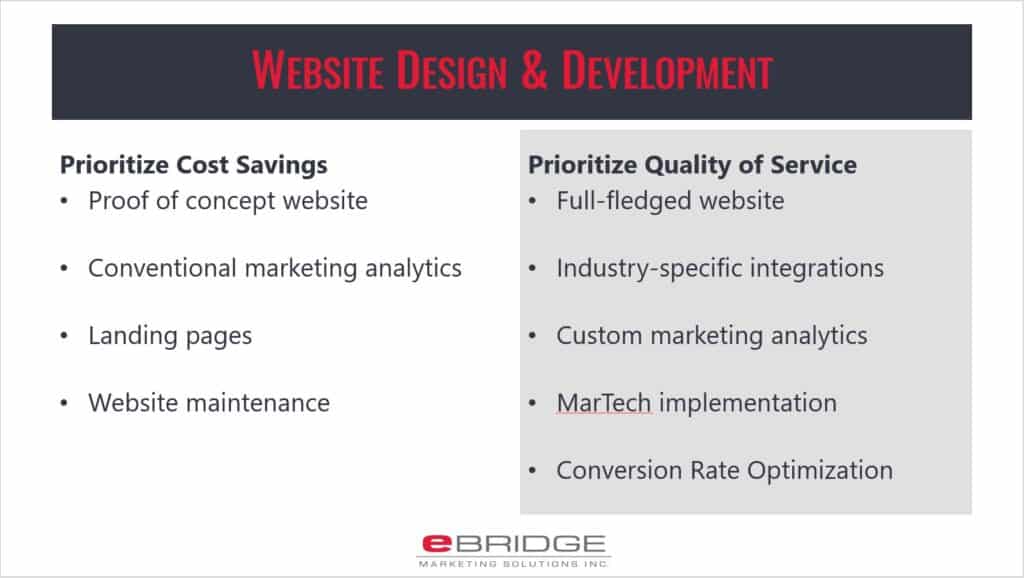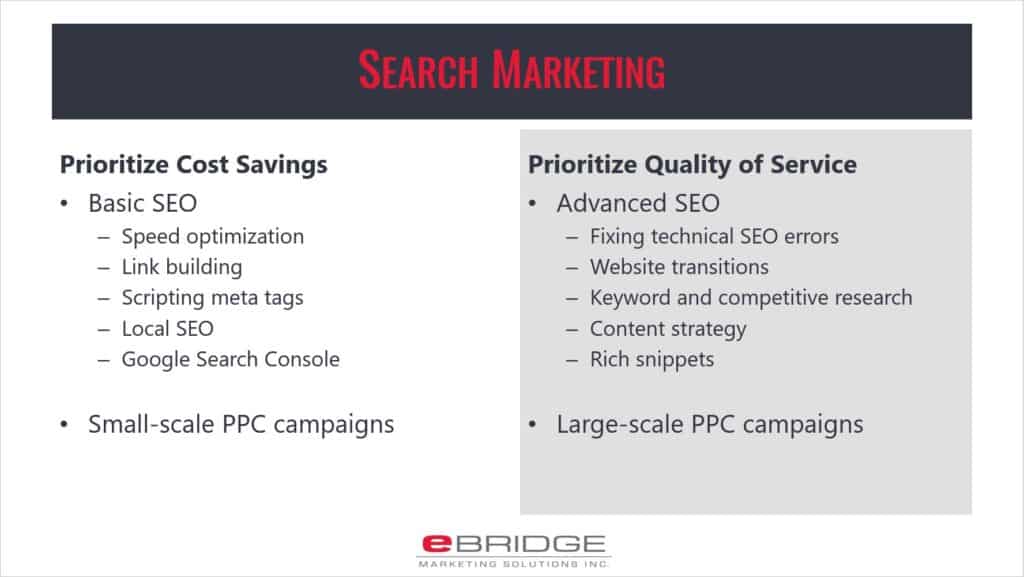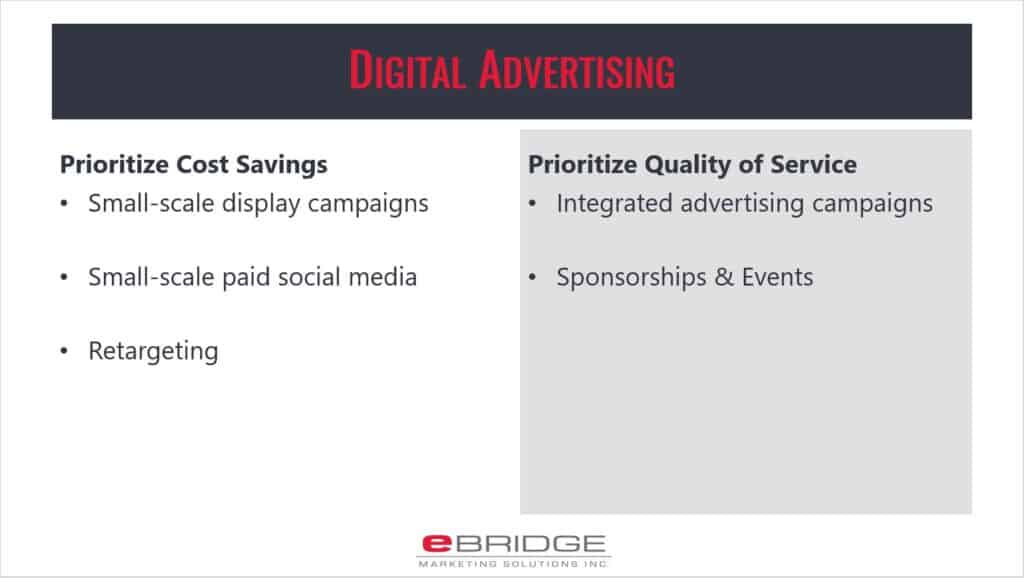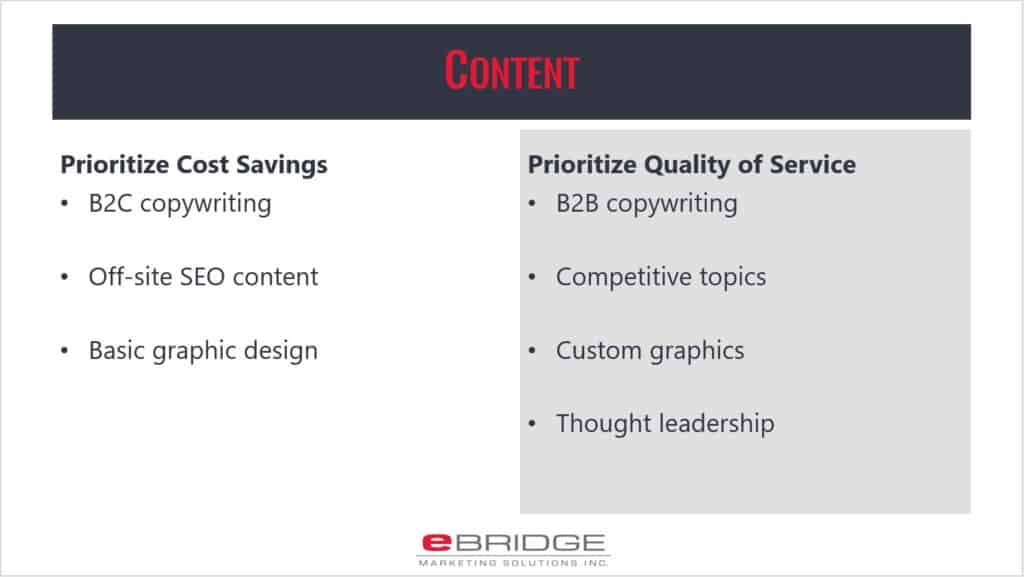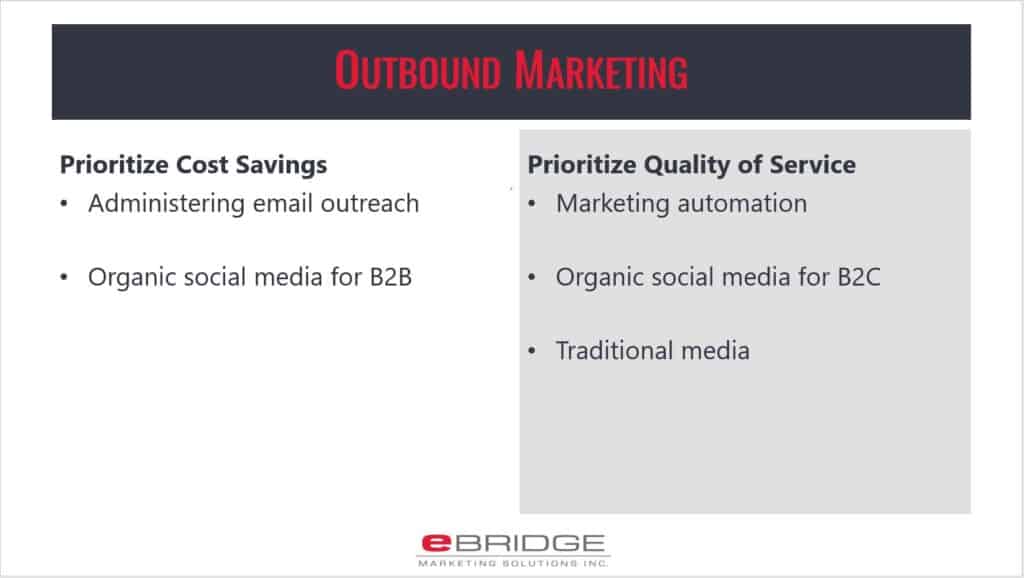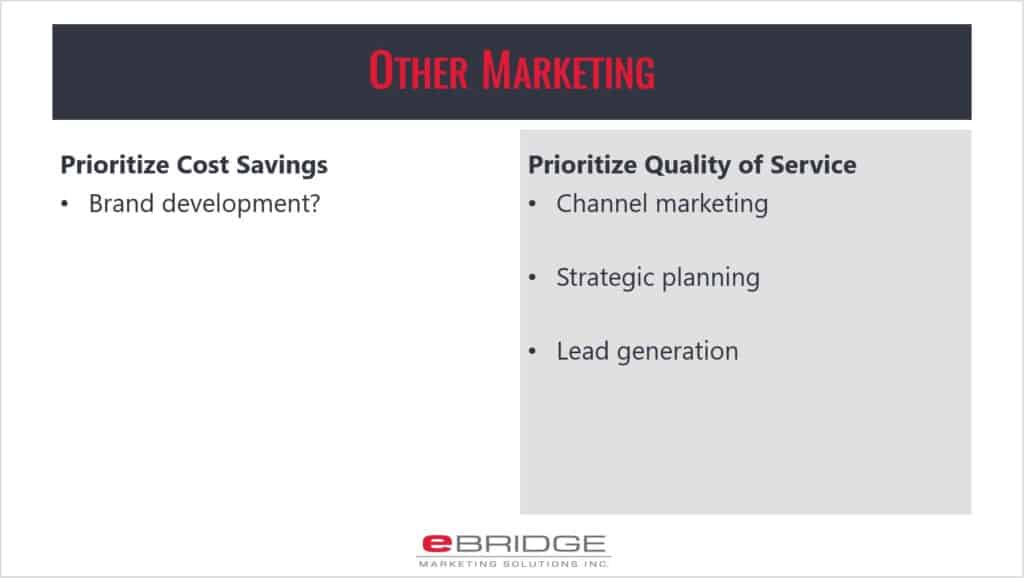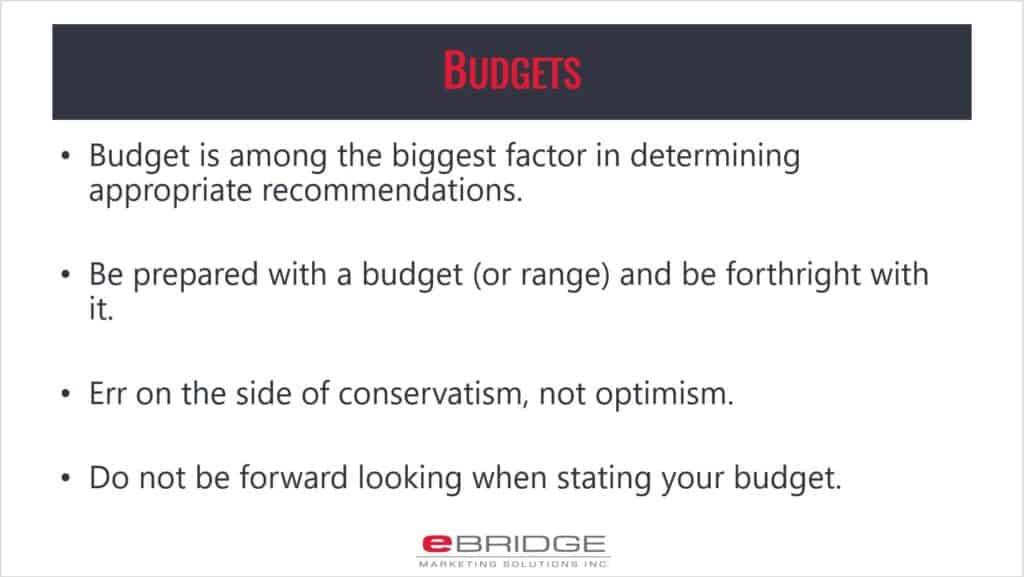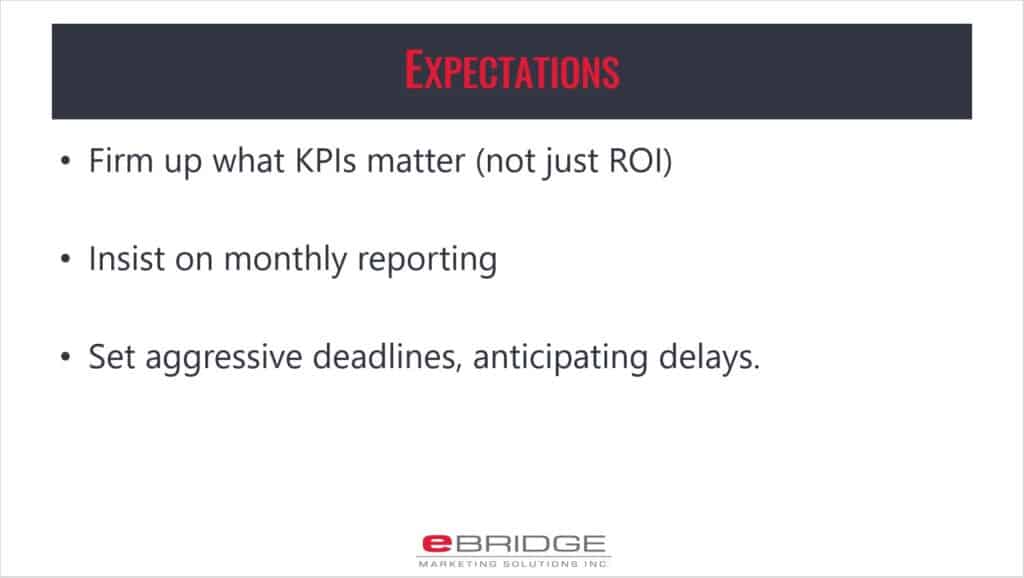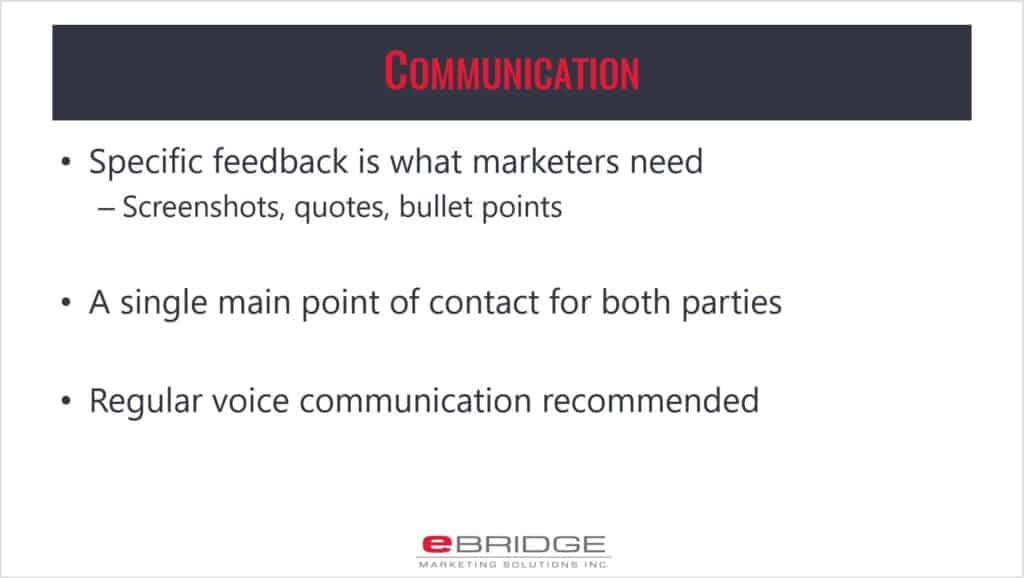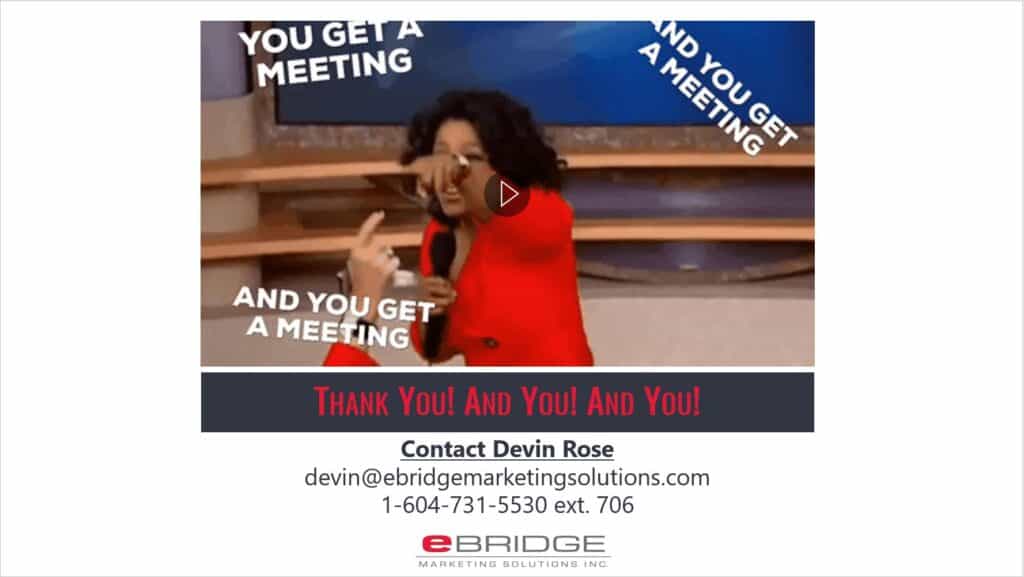Outsourcing Marketing Effectively (Webinar)
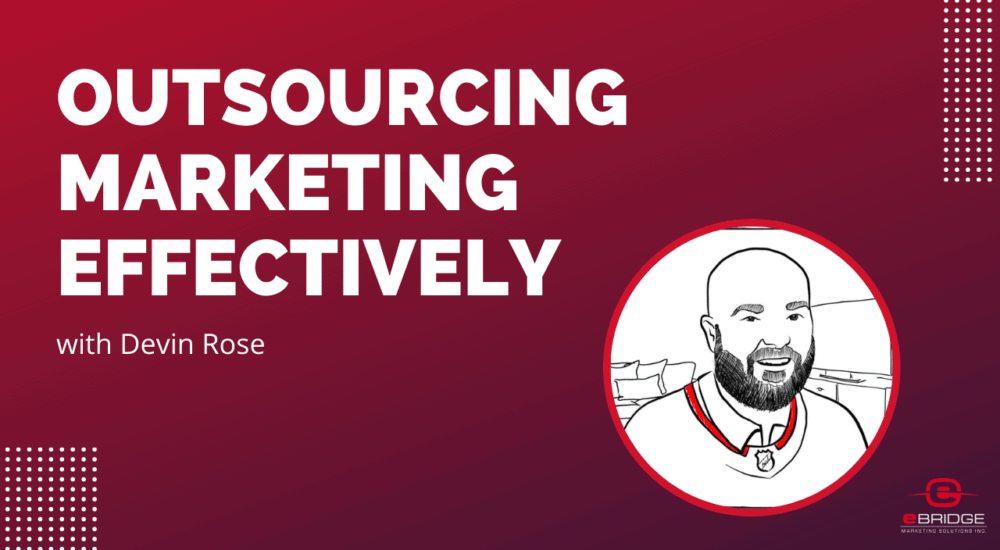
Recently I was invited to give a presentation about marketing for a lunch and learn for Tandem Innovation Group, which describes themselves as “affiliate firm of Independent Professional CFO’s, Controllers, Project Accountants and Bookkeepers.” Tandem is a network that connects those with a need for fractional accounting with qualified accountants. Keeping with the spirit of working with outside professionals, my presentation entitled ‘Outsourcing Marketing Effectively’ discusses marketing tactics where low-cost can be prioritized, marketing tactics where quality-of-service should be prioritized, in addition to some general tips when working with outside marketers.
Webinar Transcript
The transcript for this webinar has been edited slightly for readability. Please excuse any transcription errors.
Host: Alright. So the session is now recording. Welcome everybody to this fantastic lunch and learn. Today is the 24th of February and we’re so honored to have Devin Rose here from eBridge Marketing Solutions to join us today to provide some great uh talk on some marketing and the topic today as you can see on the screen “Outsourcing Marketing Effectively.”
We have a couple of our team members from the marketing team. So it’s hopefully going to be advantageous for them to hopefully learn something as well and for everyone else. A number of affiliates on the call today as well, so I’m going to pass it over to Devin to kind of get started and we’ll let anyone else that comes in the room in one by one, and we’ll go from there and we’ll leave. If you guys have any questions, feel free to put them in the chat throughout the session today. Devin is happy to answer them as we’re going along.
There’s Tanya, I’ll let her in, and I’ll monitor the chat and let Devin know of any questions that come in. We can do a more of a formal Q&A at the end and kind of share with some of the affiliates if they have any questions on that. So Devin, I’ll pass it over to you. Thank you so much for joining us today and giving us this wonderful presentation.
Devin Rose: Thank you very much for that nice introduction and thanks everyone for joining us today. The topic of today’s presentation is ‘Outsourcing Marketing Effectively’ and there’s kind of three things I’m hoping to leave you with today: some suggestions for marketing that can be outsourced cost effectively where you can still get good value, some suggestions for marketing that can be outsourced primarily only to people who you should trust that they have the quality skill set to handle it, and also just some general tips for dealing with outside marketers in terms of just working efficiently with them.
So before we get into the presentation today, I’ll tell you a little bit about myself and eBridge Marketing Solutions who’s my employer. So eBridge Marketing Solutions is a boutique marketing agency serving IT service providers. So a lot of managed service providers, data centers, web hosts, security companies and kind of anyone in that space. Some of you might be familiar with my boss, Hartland Ross who is involved with Tandem. We are located in Vancouver, Canada, and established in 2001. So we’ve been doing this for 20 years now. I’ve been working with Hartland for seven years and we offer a full range of marketing services. So eBridge is really focusing on B2B companies, but this presentation is broader in scope. I do have experience working in B2C as well and I have an entrepreneurial background myself. So if you have any questions about marketing, whether it’s B2C or start-up oriented, that’s perfectly within the scope of what I can comment on.
Environmental Factors
And so before we get into the meat and potatoes of the presentation today, I just wanted to discuss a few environmental factors that are key to the marketing landscape at the current time, and I promise I’m only going to use this word once, but COVID has had a big impact here in terms of maturing the market for freelancers and people working from home. Essentially people before who weren’t situated to work from home, probably have a nice little space, a desk space where they can do work quietly now through their day job. And so it just facilitates more people being available to freelance and to have a side gig as well. And this is just furthering what we’ve seen from globalization over the last decade or two where the available labor pool is expanding. There are more choices, and marketing is a good example of this because it is a task that can be done remotely a lot of the time. And also the marketing mix is just becoming more complicated over time here; we’re getting more decision-makers involved, there are more devices, there are more offices, people are becoming more marketing savvy, and the old tactics that used to work don’t work anymore. You have to be a little bit more nuanced. So it’s becoming more complex and the end result is that companies who are doing marketing do need to have different options of labor available and there is a need for outsourcing because pretty much the idea of a jack-of-all-trades marketer is behind us. It’s just too multifaceted to expect one person to have all the skill sets that are needed.
How May Start-ups Most Effectively Outsource Their Marketing Efforts?
So this brings us to the big question of today, and what I’ll be aiming to answer is: how may start-ups most effectively outsource their marketing efforts? And I can draw on this question from a couple of perspectives. Working for a marketing agency now obviously I’m on that side of the fence and can tell you a little bit about my experiences and what’s worked best working with clients. And I’ve also worked with lots of marketing people through their outsourced efforts.
Spend Wisely by Aligning Cost and Quality
So the first tip I want to talk about, and frankly this is I would say the bulk of the presentation today, is to spend wisely by aligning cost and quality. And in this section, I’m hoping there might be some good questions that come up and please feel free to ask them because frankly a lot of the things I may be talking about are debatable. I’m going to be making some sweeping generalizations about very large topics. So hey, that’s great for debate and if you disagree with me, I’d love to hear from you, because there’s certainly different ways to go about this section.
Factors Impacting Cost of Labor
So let’s talk about, you know, the sorts of factors that impact the cost of labor and the cost of marketing labor, specifically. The big one obviously is cost of living and I live in Vancouver. So you know I think we’re the second most expensive city in the entire world to live in. So the implication for me a lot of the time or for anyone who’s doing marketing in Vancouver or another major city, is if you want someone who has local knowledge of your market the compensation is going to be commensurate to their cost of living. Obviously there’s many places in the world where the cost of living is lower and if for those people they might not have the same knowledge of the Vancouver market. So you kind of have to determine whether or not that localized knowledge is valuable enough for you. The other thing obviously too is skilled professionals tend to congregate towards cities, and cities have higher cost of living. So if you want quality help, generally you’re going to pay for it.
Another factor influencing it is domain expertise. So essentially how skillful the person is in their particular avenue of marketing, and I’ll contrast this with industry experience where you could have someone coming straight out of college who’s really good with technical SEO, but they might not have the ability to apply it to your specific industry, knowing the nuances of the phrasing for the keywords that people are searching for and so on. And so generally speaking, and the reason why I have this set up as a Venn diagram, is if you’re only relying on one of these factors, if that’s all you need for the person that you’re getting the outsourcing from, you know you’re going to be more likely to be able to go for a cost-effective solution.
But if you’re [needing] two or three of these things, it’s going to be more costly in terms of labor and frankly you’re going to want to be paying more for cost of labor because [those are] the people who actually are able to do the job. And so it’s through this framework that I’ll analyze the tactics that are to come here.
Website Design & Development
So let’s start with website design and development.
Prioritize Cost Savings
So when does it make sense to look towards cost savings when it comes to web design and development?
Proof of Concept Website
If you’re a new start-up, and I realize that there is a variety of different stages of growth in terms of the start-ups that are attending today, but if you’re a new start-up and you’re still kind of at the proof-of-concept stage, you know that’s where you want to be focusing on cost savings with your website, like a simple website either through WordPress or a drag and drop website builder is going to suffice. Because with proof-of-concept websites, you might need a simple e-commerce store, but generally speaking the website’s going to be pretty straightforward. [It’ll] have the kind of standard sections of a website that you expect: the About Us, the Home Page, you know, some product or service pages, the cart if it’s necessary, you know, Contact Us, all those things. We’re not really reinventing the wheel at this stage so it makes sense to focus a little bit on cost savings rather than going for somebody who’s more expensive, and it’s a good one to outsource too because you know for a basic website like that, you’re not going to need a lot of industry-specific knowledge or knowledge of the local environment.
Conventional Marketing Analytics
Another cost savings one to focus on is conventional marketing analytics. So I’m really talking about Google Analytics here. I’m sure most of you probably have Google Analytics on your websites already. If you don’t, you should get it. It’s free and setting up Google Analytics out of the box is pretty straightforward if you just want to get the basic tracking to see how many people are coming to your website, how long they’re spending on your website, how many pages they’re visiting, etc., that’s pretty straightforward to set up. Any web developer has probably done it a hundred times and it doesn’t matter where they live, or if they have knowledge of your local market or anything, they’re going to be able to do that.
Landing Pages
Landing pages are also one where you can get good value at low cost because there are some really good tools. Being based in Vancouver, we like Unbounce for making landing pages because they’re based in Vancouver as well and it’s priced attractively. They have some really nice templates and they make the entire process pretty easy, so it’s a good cost saving measure to use a landing page tool like that. Of course you can do really complicated landing pages as well, but I would say the opportunity cost is probably worthwhile to invest in some other marketing tactic.
Website Maintenance
Website maintenance…so this is really important nowadays with ransomware becoming more and more popular, and the biggest way that people get themselves in trouble with ransomware is not maintaining their website in terms of not having regular backups but also not keeping your CMS and your plugins updated. So it should be done at least monthly, if not more regularly, and it’s super important but it also isn’t super expensive. It’s like hundreds of dollars a month for a service like this. So, it’s definitely something you can outsource effectively and I would highly recommend it. If you’re not doing it, you should get on it, because ransomware is no joke.
Prioritize Quality of Service
And so on the quality side of things where does it make sense to spend a little bit more um and get that value?
Full-Fledged Website
So if you have a full-fledged website, if you’re a little bit more developed in terms of your stage of growth for your start-up, you definitely want to hire someone who’s a little bit more experienced. Your website is the main thrust of your brand’s personality online. You don’t want to entrust your brand’s personality if someone doesn’t know what they’re doing when you’re at that stage of growth. Also, if your industry has any specific integrations. So a couple examples come to mind…in the real estate industry there are real estate listing APIs that need to be integrated into websites; that is going to require a little bit more industry specific knowledge. Somebody who’s a really junior sort of a person is not going to be able to help you there. Likewise in some of the industries we work in, like the data center industry and hosting, there are specific payment providers — Ubersmith comes to mind — where there is specific knowledge [needed] in terms of how you actually integrate [it] into your website, you’re going to want somebody with experience to do that.
Custom Marketing Analytics
Custom marketing analytics – so while the conventional setup from Google Analytics is easy to get going out of the box, it can get pretty hairy if you are doing things like wanting custom attribution. Also, if you have sub domains, like maybe your web store or something is on a subdomain, that’s different from your main website, and any sort of wrenches like that quickly make the setup for market analytics way more complicated and takes it from kind of a junior task to something that you actually need someone who has really good industry experience to do it.
MarTech Implementation
MarTech implementation – so this is kind of similar to custom analytics in that it’s not hard to get MarTech set up on your website, but if the technology is really integrated into your website, like say something like a HubSpot where you know it’s not just a matter of putting down a piece of code, there’s setup involved in it, then you’re going to want somebody who knows how to go through those steps.
Conversion Rate Optimization
Conversion rate optimization – this is something that requires in my opinion… you need to have not only the website and development skills, so the domain skill, but you need to have an understanding of the psychology of the target market. So if you are offering a service that is locally oriented, you do want to make sure you have somebody who understands the local market doing it, not someone who’s completely divorced from your country or your area. And you also want to have someone who has industry experience too. You need both, because conversion rate optimization is essentially putting yourself in the position of a potential client or lead and thinking through the checkout process from their perspective. So without that understanding of the target market you just can’t really do CRO very effectively. And what’s the point of having a nice website, of course, if no one is going to it…which brings us to search marketing.
Search Marketing
There’s kind of two aspects of search marketing – there’s paid search and there is organic search.
Prioritize Cost Savings
Organic Search
So on the organic search side, SEO, there’s some basic tactics that can be done by pretty much anyone who has the SEO chops. So these are some really good ones to try to outsource more cost effectively.
Speed Optimization
Speed optimization is a big one. This is important not only for Google because that’s a major factor that Google uses when ranking your site but also for users, I mean I’m sure everyone here can relate to having visited a website and waiting five seconds for it to load, and then leaving the website. So if your website’s not up to speed, then you’re losing out big time, and there are some low hanging fruit measures that you can do to speed up a website. There are some plug-ins that you can implement to help reduce the size of images, there’re cache plug-ins, and there’s a variety of other ones as well, and any experienced web developer, regardless, if they’re in your market or if they’re experienced in your industry, will be able to do that effectively.
Link Building
Link building – This is also a good one to try to outsource cost effectively because frankly it is very time-consuming. Link building is really the process of building out your backlinks, you know, through the efforts of improving your offsite SEO. And the actual work involved here is reaching out to websites that are related to your business, or maybe they’re local business associations, or just websites that generally publish information about your industry, and asking them to publish content for you to link back to your website. And the extent that they do that it improves your backlink profile and your domain authority. So it’s a worthwhile endeavor. It’s less important than it used to be though, and it is very time-consuming because you get a lot of rejection frankly, and just way more no’s than yeses. So it makes sense to have someone who’s a little bit less expensive in terms of the hourly rate to facilitate that outreach and to get them the content that’s needed.
Scripting Meta Tags
Scripting meta tags – So you know every web page has a certain number of tags, or at least they’re supposed to, to communicate with search engines effectively. So, you want to make sure that your title tags, your meta tags and also your social tags these days are optimized. The main purpose of them frankly is to help facilitate the relationship at Google and give Google what they need. So you can get away with using a cheaper provider for these. If you’re really concerned about having nicely scripted ones that really represent your brand well, you might want to have somebody who has a little bit more industry experience take care of them. But if you’re primarily looking at it through the lens of SEO, then you can usually outsource it overseas or something like that effectively.
Local SEO
Local SEO – So this is kind of counter-intuitive, but local SEO doesn’t really require a lot of local knowledge. It’s mostly about going through the Google My Business listing and kind of giving Google everything — and other search engines too, but mainly Google — everything they need. So you show up on Google Maps and just so Google knows that you’re relevant to people searching in your area. So it’s just a checklist of things that need to be done there and it doesn’t require a great deal of specified knowledge about your market or your industry.
Google Search Console
Google Search Console – This should be set up for everyone as well. You know this is a tool that gives you great intelligence about your search traffic and it also helps you facilitate any issues, like it’ll show you issues to do with your indexing, issues to do with your site or how your site’s being crawled and offer solutions for them. So getting that setup is pretty standard these days too and everyone should have it.
Small-Scale PPC Campaigns
And then on the paid search side of things, for small scale campaigns it can make sense to outsource them cheaply. There’s some low-hanging fruit that makes sense to do for most companies like branded keywords, for instance. For a campaign like that, a lot of providers are going to be able to help you suitably. And the other thing with PPC campaigns, is there’s kind of two components to them right? There’s the ad spend, and then there’s the management fee. And in a way, the management fee is kind of overhead for the ad spend. So if your ad spend is low for a smaller campaign, it just doesn’t make sense to spend a lot of money managing it because you’re just not going to be able to get the incremental benefit from that management to make it worthwhile. So for small scale campaigns for PPC, it’s probably best just to keep the scope a little bit simpler and in that case it is a good one to outsource cost effectively.
Prioritize Quality of Service
On the other side of things, when you should be prioritizing the quality of service, well for SEO it’s really the advanced SEO.
Technical SEO
So fixing technical SEO errors on your website – this can be multifaceted in terms of what skill sets are needed. So that one you do want to pay a little bit more for. And it’s also the type of thing where there could be a significant hindrance that’s been caused by one issue that you might not be aware of. So the value that can be provided from having expertise in that area is significant.
Website Transitions
And similarly, website transitions – So this is when you’re redesigning your website, relaunching the website. From Google’s perspective, the new website design is essentially a new website. Out of the box by default, they do not associate it with your previous website. So there’s a fair amount of work that needs to be done ahead of time, during, and after the transition to ensure that none of the SEO credibility that you’ve gained is lost in the transition. It’s especially if you have a fair amount of SEO credibility already, if you’re getting a lot of search traffic. I can’t emphasize enough how important this is because the risk of a website transition is significant you could lose it all and essentially be starting from zero, or you could plan it out do it well and keep the continuity for your website. So because of the risk there, even though this one doesn’t really require industry-specific knowledge, I think it is really important to get someone experienced in website transitions.
Keyword and Competitive Research
Keyword and competitive research – So you know these are both in the same bucket in terms of the strategic leg work for SEO. And yeah, for these ones I do think it requires some industry-specific knowledge. Like I’ll give an example from when I used to work at Ritchie Brothers Auctioneers, which is an industrial equipment auctioneer. One of the keywords that was important for them was the “crawler tractor”. Well, crawler is a word that, you know, it can refer to like babies, to bugs, it can refer to so many different things. So not having that industry-specific knowledge and [not] being able to [do things] like add on the negative keywords, so we can actually get to the right type of crawler that we want, that’s huge. You just don’t be bidding on baby stuff when you’re trying to sell industrial equipment obviously. So having that industry-specific knowledge is key.
Content Strategy
Keyword and competitive research often lay the groundwork for a content strategy, but the content strategy also looks at what content you have on your website. For B2B companies, what sales collateral do you have, are there any gaps in that? To do that sort of analysis you had to have the industry-specific knowledge and the knowledge of what is missing essentially, and you’re not going to get that from somebody who’s junior and doesn’t have that industry-specific knowledge.
Rich Snippets
Also rich snippets – so for these, you might not be familiar with the name, but you’ve almost for sure seen them at the top of Google pages, where there’s a little section that Google pulls out. So quite often I’ll see this with recipes actually. I’ll Google like “how long to cook a chicken breast at 400 Fahrenheit” or whatever, and the first three steps are offered to me within the Google search results as a rich snippet. So it’s really desirable to get those because you stick out so much more than anyone else who’s in the Google search result. And it’s tricky to show up for them because they’re very competitive and also there’s not like any hard and fast rule for how to show up there. Google will select you if you’re generally doing SEO correctly, if you checked all the boxes in general. So you kind of need somebody who has a holistic approach, who’s got the experience to know what’s missing and what to add there in order to show up.
Large-Scale PPC Campaigns
And then on the paid search side of things, for large-scale PPC campaigns, you definitely want to be dealing with somebody who’s got some expertise. I feel like it almost goes out saying. Obviously with pay-per-click you can spend a lot of money very quickly, and the skill [lies in] really figuring out how to spend that effectively. You don’t want to entrust that with somebody who doesn’t know what they’re doing. They definitely need to know your industry and probably your local geography as well.
Digital Advertising
Picking up from search marketing, there’s also digital advertising. So another way to send people to your website.
Prioritize Cost Savings
Small-Scale Display Campaigns
We can prioritize cost savings for small scale display campaigns. So actually all three of these bullets on the left-hand side are kind of related. So I’ll address them at once. There’re small scale display campaigns, small scale paid social media, and retargeting. So these are all using primarily banner ads but also potentially some video ads and you can facilitate these sorts of campaigns through the major networks like Google and Facebook, obviously not Google for social media. Regardless, it’s similar to the PPC campaigns where the management fee is overhead on these campaigns. So you don’t want to be spending a lot of money on managing small campaigns. Especially for something like retargeting too, it doesn’t really require a lot of industry-specific knowledge. Social media [management] may be a little bit more [skillful] but I think for small scale campaigns it probably doesn’t make sense [to prioritize quality of service].
Also another thing to mention too is display campaigns in general don’t perform as well as they did five years ago. So it made more sense five years ago to spend big bucks on management, because there was more potential ROI. These days, there’s just not quite as much potential.
Prioritize Quality of Service
But having said that, on when you should prioritize quality of services.
Integrated Marketing Campaigns
If you’re doing integrated marketing campaigns or advertising campaigns involving multiple networks, or where perhaps it’s part of a marketing automation endeavor where maybe you’re serving different messages to people in different parts of the buying cycle…that’s getting to a level of sophistication where you do need that industry-specific knowledge. So that’s when you want to spend a little bit more.
Sponsorships and Events
And with sponsorships and events, anyone can go online and Google “Canadian small business events”. But it does require industry-specific knowledge and knowledge of [the] geography or where you’re working to know which ones are actually worthwhile. You don’t want to be showing up to events where you’re just completely wasting your time because the cost of going to these events is your time more so than [hard costs]. So it makes sense to get somebody who’s going to be respecting your time by sending you to the right sort of events and the right sort of sponsorships.
Content Creation
Content creation – So this really ties into the SEO piece as well, because so much of SEO these days is copywriting and creating good content.
Prioritize Cost Savings
B2C Copywriting
So, if you’re in a B2C industry, I think you can get away with copywriting using a little bit more of a cost-effective provider than you could if you’re in the B2B space. B2C people aren’t quite as picky, and [copywriting] is probably not worth as much, because they’re not quite searching as much. So I think with B2C you can get away having someone who’s maybe a little bit more junior during the copywriting.
Off-site SEO Content
And off-site SEO content. So this goes back to us talking about the backlinks, about reaching out and asking people to publish content to secure those backlinks. The content that you’d be publishing there is not really meant for human consumption. It’s more about trying to get the backlinks, so given that, it makes sense to prioritize what’s good enough versus what’s a perfect piece of prose. So you can get away cost effectively there.
Basic Graphic Design
Basic graphic design – I’m sure many of you have experience with websites like Elance or Fiverr and there’s tons of really great graphic designers on there, and they don’t really need industry-specific knowledge, or knowledge of your location, to do their job effectively. You can provide them with that necessary feedback. So it’s a good one to outsource.
Prioritize Quality of Service
B2B Copywriting
And on the quality-of-service side, for B2B copywriting it’s a totally different animal than B2C. B2B people are inundated all day with content and messaging and kind of just get in the habit of blocking it all out. And that’s coupled with the fact that so many companies these days are rightfully prioritizing content marketing as part of their inbound efforts, right? So you know how do you stick out from the crowd? Really the only way is by having better quality content. And that’s how you’re going to get people coming back and not marking you as junk and actually reading your newsletters, etc. So you know it makes sense to spend a little bit more on the quality for B2B than it does for B2C.
Competitive Topics
You know similarly for…you know very competitive topics even on the B2C side of things, the more competitive the topic is in Google the more that you want to be investing in some expertise to make sure that their writer is hitting the right keywords, that they know the right keywords where there’s an opportunity to hit them. So yeah, the more competitive is the more you want to be prioritizing quality.
Custom Graphics
Custom graphics so you know the greater the extent that you have to explain the vision of what graphics you want, the more it’s going to make sense to work with somebody who’s probably in your market where there’s no language issues or anything like that. So yeah, it’s the degree to which it requires explanation, means that you should be prioritizing probably a more costly provider.
Thought Leadership
And thought leadership, I mean this is probably the most obvious one I would say of the slides. For thought leadership you need the whole, all three factors – the trifecta. You need somebody who’s probably living in a city, who’s expensive, you need somebody who has industry experience, and somebody who you know has a domain experience too. So that one definitely needs to be prioritized in terms of getting a more expensive provider.
Outbound Marketing
Outbound marketing, and I’m using this term a little bit generally here for the purpose of this presentation. But generally speaking, in terms of just outreach to people, it doesn’t really cost a lot to get somebody to queue up a bunch of emails. So if you’re doing something like maybe you have 50 people you need to reach with a new offering that you put together; writing up that email once and then asking a marketing admin person who you’re outsourcing to, to actually like set up the emails in your draft folder ready to send. It’s a good use of time and it’s kind of a workaround before you’re sophisticated enough to do marketing automation and have that fully fledged going. So that’s one way to do it. They can send out your Mailchimp email blasts and all that too; just administering the email is a good thing to do.
Organic Social Media for B2B
Organic social media for B2B – So this contrasts with the content creation where we prioritized more expensive for B2B and less expensive for B2C. For social media it’s the opposite, for B2B I don’t generally recommend placing a great deal of priority on social media, because it doesn’t really generate a lot of leads these days. A little bit of an exception is made for LinkedIn where you should have a presence and everything, but for Facebook, they’ve been so restrictive with their algorithms over the years that even if you’re publishing really good content, it’s not going to get in front of a lot of eyeballs. So it makes more sense just be in maintenance mode if you’re a B2B company.
Prioritize Quality of Service
Organic Social Media for B2C
On the flip side though, if you’re B2C, I mean obviously social media is still huge. It’s gotten more difficult over the years as well with cutting down on affiliate marketers and you know, was it Kylie Jenner? She can’t just say that she’s sponsoring this product anymore without having a disclaimer on her Instagram. Those sorts of things, right? So it’s more sophisticated than it is for B2B with social media and you want somebody who’s doing more than just the maintenance mode, someone who actually has knowledge of your specific industry.
Marketing Automation
And you know, marketing automation is the top bullet there. Marketing automation is very multifaceted in terms of what you need to know to get it all set up. So this is the process of really using artificial intelligence and automation to be intelligent about the sales process so you kind of know when people are opening your emails, when people are visiting your website, when they’re interacting with your marketing in general. You measure that as best you can. You incorporate that with feedback from your sales team and that all goes into lead scoring. And then based on the lead scoring and where they are in that sales process, you know how well-qualified they are. And based on that you can serve them the type of information that they probably want, given where they are in the sales process. So that is a very integrated marketing strategy. HubSpot is probably the biggest provider and the one that we’ve seen the most often who facilitates that process. I’ve seen a lot of people sign up for HubSpot and they get overwhelmed and it sits there. And frankly these tools are expensive. So you want to make sure that you have someone who knows how to use it, otherwise you’re just going to be paying like a few thousand dollars a month for something that’s sitting there, doing nothing for you, and you may as well have just done the administrative email outreach process instead.
Traditional Media
Traditional media – So you know I think the justification for this one being in quality of service is that you can blow through a lot of money really quickly doing traditional media and it does require knowledge of the specific local market. So like what radio stations make sense to advertise on? I mean it certainly helps to have someone who lives in a local market to have a good feel for that sort of thing.
Other Marketing
And then I’ve categorized here what I couldn’t fit anywhere else, so Other Marketing.
Prioritize Cost Savings
Brand Development
Under prioritize cost savings, I have “brand development” and a question mark. I debated this one back and forth, which is why I put the question mark, and I decided to put it on the left side here, under the prioritized cost savings column, because of the audience today being start-ups. I have seen a lot of start-ups where the founder gets too into brand development too early in the company’s [growth], at the expense of the more important things that they should be doing. And why I think it maybe gets too much emphasis is because you can always rebrand later anyway. You know it’s not like you have to get it correct out of the gate anyway. Like for most start-ups, it just needs to be “good enough”, and then you can grow it iteratively; improve it, tweak it, over time. And if you do want to do a full-on rebranding later on when the company is larger, it’s no big deal, it’s not like you’re losing out or anything. So I don’t really think it makes sense to spend a lot of money on brand development early on in the start-up’s lifecycle. But having said that, I’d go back to what I said about your website and it is a big part of your brand, and you want to prioritize the personality that you’re putting out there. So I don’t want to diminish the importance of branding, but just to say that it’s not static, and because it’s not static, I don’t think it makes sense to invest a ton in it early on in the start-up’s lifecycle.
Prioritize Quality of Service
And then there are some kind of miscellaneous things where the quality service should be prioritized.
Channel Marketing
Channel marketing – So this is really a B2B tactic, similar to affiliate marketing, where you’re going to persons of influence, centers of influence, and getting them to market your products to their audience, essentially. So in the case of a lot of B2B products, the channel is MSPs or ISVs or just generally resellers and service providers. So it definitely requires a lot of industry-specific knowledge because not only do you need to have an understanding of the channel, so the MSP, but you also need to have an understanding of their customers. So psychology-wise, it’s pretty advanced, and if you’re doing channel marketing…frankly they don’t teach you about it in high school – or sorry, in university – in marketing classes or anything. So you need somebody who has that real life experience, that’s the only way you really learn how to do channel marketing.
Strategic Planning
And strategic planning – I think that’s pretty self-explanatory, where you don’t want to be entrusting the future of your business to somebody who doesn’t know what they’re doing. You want, somebody who really knows your industry.
Lead Generation
Lead generation – The reason why I put this in into the quality of service versus cost savings is because there are lead generation options that are affordable and there are ones that are more expensive. But [for] the ones that are affordable, you kind of get what you pay for to a large degree. Unless you really get lucky in terms of finding a solution that you know is both cost effective and gives you good quality leads. But if you’re getting bad quality leads then it’s just a waste of time, it’s kind of like the conferences and events right, where there’s a significant cost to actually following up on the leads and all that. So it just doesn’t make sense to be filling your pipeline with poor quality leads.
Other Tips for Working with Outside Marketers
So that was everything in terms of aligning the cost and the quality, and so I do have a few more tips just generally for working with outside marketers as well.
Budgets
So let’s talk about budgets. I know this is kind of a contentious one a lot of times, but the reality is that from a marketer’s perspective, what the budget is, is one of the biggest factors, if not the biggest factor, in determining what appropriate recommendations are. And so I think when you’re speaking to a marketer, it goes a long way to be prepared with an idea of what your budget is, and to be forthright with it. So like a lot of people might not know specifically what [their] budget is or [they] might not have an exact number in mind, in which case providing a range or an approximation is fine. But err on the side of conservatism and not optimism, because as marketers, we can’t help ourselves. We will do the optimistic portion of your budget, you can count on that, right? So you kind of have to help [us help] ourselves by being a little bit cautious in terms of your budget estimation so it’s more realistic. And also don’t be forward-looking when stating your budget. So the kind of stereotypical answer that I get sometimes when I ask about budgets is: “well, you know, if we get ROI, then the budget is infinite.” It doesn’t help me for planning purposes though. It’s really about what the budget is today because that helps me formulate what I can actually reasonably recommend to you or to my clients. And you know as I’ve illustrated on the previous slides, there are different options for the same use cases. So if the budget was ten thousand dollars a month, let’s talk marketing automation. If the budget’s two and a half thousand dollars a month let’s talk manual email outreach, you know that sort of thing. That’s just an example off the top of my head but it really does play into it. And be forthright too. I mean I can’t speak for all marketers, but I’ve spoken to clients who I couldn’t work with because maybe they didn’t have a budget that we could work with. I was happy to recommend them to someone who I knew who would be able to help them better, so there’s really no downside to being forthright and it’s something I see a lot where people are kind of trying to mask their budget. And I think their reasoning is they don’t want to constrain the marketer into limiting what options they’re going to recommend. They kind of want the best recommendations possible. But what they don’t realize is the best recommendations are different depending on the budget.
Expectations
So in terms of expectations as well, I mean this is just good general business practices obviously, in terms of controlling expectations, and it’s no different with a marketer. And just a few common-sense ways to do this is to firm up the KPIs that matter to you. These do vary industry to industry. And [don’t] just focus on ROI because ROI is quite difficult to calculate these days, especially for B2B; it’s a little bit easier for B2C. But you should be looking at ROI in conjunction with other marketing metrics because we’re not going to be able to measure ROI perfectly. There’re just too many restrictions these days on doing so. So you know you have to take it into consideration with other factors as well. And firming those up at the beginning of an engagement [with] marketing agencies is really important. [It] gets you on the same page. I would insist on monthly reporting for any marketer you’re working with and make sure they’re reporting on those KPIs. Kind of self-explanatory, but it just helps to keep them accountable, helps to keep you in the loop, and to see what’s going on with progress, in terms of results.
And setting aggressive deadlines while anticipating delays. So I think it’s almost like a meme, how like, say website projects are always delayed. You know as a marketer, I definitely try my best to steer it towards getting them on time, but the reality is that these projects do involve feedback quite often from many people that leads to delays. So I think when you’re working with marketers, you should try to be a little bit aggressive for your deadlines, to get them to speed up the process a little bit, and that’s what I would do.
Communication
And in terms of communication, marketers really need specific communication. Like if you’re…so I wrote here screenshots, quotes and bullet points…if you’re describing something visual that you don’t like or you want changed, take a screenshot of it and highlight exactly what you don’t like about it, and be as specific as you can. Likewise if there’s something in some copywriting that you don’t like or you want changed, quote it. Generalized comments are really hard to deal with as a marketer sometimes and it just inevitably ends up in a bunch of back and forth and kind of wasted time for both parties. So just being as specific as possible is really helpful, almost to the point of being patronizing to be honest. Like especially if you’re working with an overseas marketer, where there might be language issues, be borderline patronizing, because it’s not patronizing, it’s actually just good communication.
Having a single main point of contact for both parties is also crucial. As I mentioned, there tends to be delays in marketing projects when many people are providing feedback. So like the stereotypical example is maybe, you know, the marketer at the company signs off on something and then two weeks later the owner doesn’t like it. It’s just so inefficient. So you really need to have one point of contact at the marketing agency, one point of contact for the client, and then the client needs to be responsible for collating all the feedback from their team.
And just regular voice communication. So similarly to the reporting, having that frequent cadence. Just little things come out of phone calls, you know, little priorities the marketer might not have known about and it’s important to have that constant communication.
Q&A
And that really ends the presentation. I’ve gone over the marketing tactics where you can prioritize quality, and then some marketing tactics where it can make sense to get good value out of lower cost providers. So thank you very much for joining the call today and for listening and at this point, it’d be great to take some questions.
Host: Thank you so much, Devin. That was fantastic. We’ll open up the floor to a Q&A right now. If you’d like you can unmute yourself to ask questions.
Speaker 1: Hi Devin. Thanks for joining us today.
Devin Rose: Well thank you very much for having me. I appreciate it.
Speaker 1: I’d love to ask a question that many people might have. If you’re working in a start-up, what would you prioritize in terms of a marketing spend, and what projects would you kind of, if you were step laddering it from, you know most start-ups will start with “Where do I start with a hundred dollars a month or even five hundred dollars a month? You know what does that look like…so that you can develop the relationship into a bigger one until you figure out what is actually needed?
Devin Rose: Good question. So it’s going to vary depending on industry and everything. So I’ll make some wide sweeping statements that’ll not be applicable for everybody. But I think once you have a website that’s set up that’s “good enough”, social media marketing is probably the way to go for a lot of this. You know a nice thing about social media is you can do, there’s the kind of demand generation part of it which you can do from one platform, but there’s also the retargeting that you can layer on. And the retargeting is nice because it allows you to engage with people who’ve already visited your website and left the website without completing a purchase. So it’s not really like marketing automation or account-based marketing where it’s more about developing the relationship and engaging with people over time. But this still allows you to engage with them in a little bit more of an informal way. And you know besides that, I would also just say like the low-cost things, like email marketing is still huge, right? Especially for B2B but also for B2C. So you want to be making sure that you have a form on your website to collect people’s email addresses, and that you’re following up and sending email blasts and those sorts of things. And again it all plays in with the social media too, right? Because if you’re driving people to your site and you get them to sign up through email that’s just another way to re-engage with them.
So yeah, I mean, just generally speaking I would say it probably makes sense to make sure you have a good website, good enough website, a little bit in the way of a process around email marketing and reaching out to people that way, and then to layer on probably one ad network, probably Facebook, maybe Google depending on your industry, or maybe LinkedIn. To be honest you could consider all three, it’s going to depend. But I would imagine for a lot it would be Facebook.
Speaker 2: Hey Devin, it’s Anders Cruz here. In a prior incarnation we were using some geo-specific or geo-fence delivery of some online advertising that wasn’t very successful. But I’d be interested to hear your take on when it has been effective and when it when to use it and when not to.
Devin Rose: So we talked about Facebook in particular, and one of the challenges Facebook has had, is they have not been very good with their geo-specific targeting traditionally. It’s kind of frustrating too because they…I actually just saw news last week, that they knew about this issue and they chose not to fix it. So I hear you, it is a challenge. There’s no real easy work around with it because it does kind of lie in the hands of the ad networks. So I mean there are some ways you can maybe mitigate it by maybe instead of doing just the geo targeting, maybe you also layer on targeting for local business groups, something like that, right? You double up on it, that would be one way to do it but yeah I definitely hear you the geotargeting is not great. It’s better for Google, but for Facebook it’s pretty subpar.
Speaker 2: Okay, yeah our experience was that you know we were trying to use it to be cost effective to target the ads and what happened was we just got virtually no traffic through it but so i like your idea about don’t use, not and as a modifier right? So business group in the area or not because otherwise you’re not going to get any hits at all.
Devin Rose: Yeah, I would agree.
Speaker 2: Fantastic presentation, really.
Devin Rose: Thank you.
Speaker 3: Hi Devin, it’s David here. I do have one question in terms of marketing B2B. Well like for consultants like yourself, like e-blasts and things like that, would you say that that’s effective considering a lot of the corporations just get a ton of blasts all the time, and you’re just kind of just “another email” that they’re gonna delete, without maybe opening it for maybe five seconds. Like how effective is that even relative to just simply putting out good content?
Devin Rose: It’s more effective than you would imagine. I’m consistently surprised by it. People still open email. And it is obviously the tone that you have in the email that’s important too. If you go for a conversational tone that’s short and to the point and just gets to what [readers] actually want, that tends to be what performs the best. I mean still the majority of emails obviously aren’t going to be opened. You are going to have people who just archive you every single time, but it’s a bit of a numbers game too, right? And the more that you grow your database the more leads you’re going to have. We do a fair amount of email marketing ourselves and it’s definitely effective for us and we recommend it for our clients. There’s also email marketing to your own clients right? Where you could do upselling, that sort of thing, or just let them know what you’re up to. But there’s also lead generation through outbound email marketing which again is surprisingly effective still.
I know though that there’s a lot of Canadians on the call today, and in Canada, unfortunately we do have more anti-spam laws than our friends in the United States. So American companies can, kind of, it’s a little bit of the Wild West down there, you can do whatever you want. But in Canada we have anti-spam laws, so you need to be a little bit careful in that regard. Frankly, just want to keep your volumes low at the end of the day. How you get yourself in trouble is if you start publishing bad quality content and people start marking you as junk mail; the email service provider will know that, and then they’ll start restricting your ability to do email blasts. So it’s quality first. If you’re doing [email marketing] to your existing customers. And I think if you’re doing outbound marketing, just being kind of more informal but really to the point is kind of what works the best.
Speaker 3: Thank you.
Devin Rose: You’re welcome.
Host: I think Hillary mentioned a question in the chat here – “What’s the best value you can offer to drive traffic to a marketing list?”
Devin Rose: Best value…umm…
Speaker 4: I’ll add another commentary to that, Devin. I know the number one rule is drive people to a list, your list is the one thing that you really own. My question is what’s the best hook to get people to that list?
Devin Rose: Well I’ll give you a generic answer, sorry. But adding value is the best thing to do. So you know, not annoying them. In the case of B2B can educate them? We work for a lot of MSPs, so I’ll use that as an example. Maybe for an MSP sending out like a security checklist is a good idea. So the call to action should probably be around, find out the latest, or keep up to date or whatever it is. Try to tease them about them missing out on something that would add value. And then of course, you got to walk the walk and talk the talk. So you want to actually deliver that value afterwards and not be annoying essentially. Did I answer your question?
Speaker 4: Yeah that’s great, thank you.
Host: And then Tanya mentioned here in the chat if you could share what your recommended e-newsletter platform and CRM would be.
Devin Rose: Would be…you know, we like HubSpot. There are downsides to HubSpot too. So the upside of HubSpot for marketers is it’s really easy to use. For the most part, the tool itself is excellent. It’s well set up, it’s simple, it makes sense. Relatively simple…it’s [still] a complicated process. So it isn’t super simple, but it’s as simple as they can make it. The downsides to HubSpot though is if you have a lot of other technology that you need to implement to your site, like maybe you have a legacy CRM or something, HubSpot does not play well with others. They really want you to sign up for them and them alone. If you’re interested in something that’s a little bit more customizable that does play well with others, another one we like is called SharpSpring. It’s similar to HubSpot, pretty much the same functionality, just not quite as well known. They’re lower cost too, so that’s a really good one.
Another thing about HubSpot, is they have so many marketing materials that it’s almost overwhelming if you don’t know where to look, to the point where they almost give conflicting information in their various help articles. So it can be a little bit difficult getting up and going with HubSpot. So if you’re not in a position to do that learning, then it might not be a good solution for you.
There’s also a lot of industry-specific CRMs and email marketing platforms. In our world of B2B tech companies, there’s one called Mind Matrix which gives you everything you need, including the CRM and the email templates and everything. I’m not as familiar with other industries but there probably is one for your specific industry as well.
Host: Perfect. And Hillary also mentioned in the chat “What about Active Campaign?” This is the one I’ve consistently heard is great.
Devin Rose: Honestly I’m not familiar with Active Campaign. So I can’t answer that one.
Host: No worries. Thank you. Perfect. Great. And any other questions in the chat or anyone in the room? Perfect. Well if no other questions, Devin that was absolutely incredible, such great value, we thank you so much again for spending the past hour with us today and providing that value we’ll definitely put the recording in the Tandem Slack channel for those that want to watch it again or for those that missed it and I’ll make sure to put your contact information there as well for anybody that also wants to reach out. So thank you again everyone for jumping on board and Devin Rose, thank you so much again for being part of…
Speaker 2: I have one final question for Devin. Devin, what portion of all of this do you do?
Devin Rose: Well, we’re B2B and we are a full-service agency, so pretty much all of it. Except the only thing that we really don’t do as much is public relations, or we’re not really a brand development shop. But besides that we handle everything pretty much.
Speaker 2: Good, thank you very much.
Devin Rose: You’re very welcome. Thank you everyone for joining. I really appreciate your attention and time today and glad it was a good presentation. Thank you.
Host: Thank you.
Posted March 25, 2021
Categories: Advertising and Marketing General,
Webinar
Tags: Content Creation, Lead Generation, SEO, Web Design
